|
|
|
Sort Order |
|
|
|
Items / Page
|
|
|
|
|
|
|
| Srl | Item |
| 1 |
ID:
185845
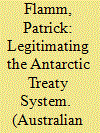

|
|
|
|
|
| Summary/Abstract |
Like other international institutions, the Antarctic Treaty System (ATS) relies on the goodwill and self-binding commitment of its members. Legitimacy, understood as the belief in the ‘rightfulness’ of a governing arrangement by its stakeholders, lies at the heart of the ATS’ success as a multilateral institution. Global warming and geopolitical power shifts are poised to challenge established forms of Antarctic legitimacy and effectiveness, with external calls for Antarctic democratisation and reform increasing. Using the concepts of input, output, and throughput legitimacy, this paper explores how the ATS has been legitimated as the only authoritative decision-making context for Antarctic matters, internally amongst Treaty Partners as well as externally towards the rest of the international community. It argues that the increase of input legitimacy through the inclusion of more consultative parties led to a perceived lack of output legitimacy for some especially environmental critics which illustrates the importance but also the limits of maintaining consensus about throughput legitimacy: the agreed upon processes and rules of decision-making. Finally, the analysis problematises the inhibiting centrality of nation states and the logic of sovereignty during times of global ecological and geopolitical change and asks how an ambitiously democratic future of Antarctic governance in the Anthropocene might look like.
|
|
|
|
|
|
|
|
|
|
|
|
|
|
|
|
| 2 |
ID:
123581
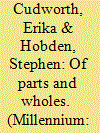

|
|
|
|
|
| Publication |
2013.
|
| Summary/Abstract |
While some theorists in International Relations have engaged with thinking about complexity, we would argue that few have thought it through to its logical conclusion - the interconnectedness of systems, and the implications for agency and structure. This article examines the structure-agency question using the framework of 'posthuman international relations', which draws on recent thinking in complexity and argues for an approach to the study of global politics that is post-Newtonian and non-anthropocentric. Key elements of a complexity-based approach are examined, and it is argued that these provide a novel way of considering issues of agency and structure. They also raise issues for the analysis of agency and the link between actions and outcomes. Complex systems can present problems of analysis related to unpredictability, causality and non-linearity. Having laid out a framework for thinking about action and context in international politics, the article turns to questions of agency and practice within complex systems. Perhaps the most significant claim here is that it is possible to conceive of agency beyond the human. Drawing upon Margaret Archer's discussions of primary and corporate agency, a threefold approach to thinking about structure and agency is developed, which allows us to think about agency beyond the human. Finally, an explanation is given as to why a complex approach to thinking about international relations ultimately implies a posthuman perspective.
|
|
|
|
|
|
|
|
|
|
|
|
|
|
|
|
| 3 |
ID:
142496
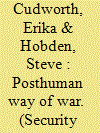

|
|
|
|
|
| Summary/Abstract |
Recent interventions from a ‘posthumanist’ or ‘new materialist’ perspective have highlighted the embedded character of human systems within a ‘panarchy’ of human and non-human systems. This article brings attention to a very particular element of materiality, one with a profound significance for issues of security – relations between human and non-human animals in instances of conflict. It is an indication of the deeply human-centred character of both international relations and security studies that almost none of the central texts mention the very significant roles that non-human animals have in the conduct of war. We argue that the character of war would have been radically different but for the forced participation by an enormous range of non-human animals. Even though, with the improvements in transportation over the last century, non-human animals are less evident in the context of the movement of people and equipment, they still play a significant number of roles in the contemporary war-machines of wealthy countries. Drawing on literature from critical animal studies, sociology and memoirs, this article discusses the enormous variety of roles that non-human animals have played in the conduct of war, and examines the character of human–non-human animal relations in times of war.
|
|
|
|
|
|
|
|
|
|
|
|
|
|
|
|
| 4 |
ID:
175167
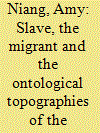

|
|
|
|
|
| Summary/Abstract |
An examination of the figure of the slave and the figure of migrant make visible important historical interconnections that sustain past and present elaborations of the human and ‘the international’. These interconnections have always been racialised and they have structurally constituted the making of an interdependent world community. A series of instrumentalised discourses, at times turned into rationalities that govern policies towards migrants, particularly in a post 9/11 context, increasingly normalises the idea that there are people that can be justifiably expelled from the civic/civil, and increasingly human sphere. The slave was forcefully removed, both physically from attachment to kin and land, and morally from the history of humankind. The migrant is pushed out of the bounds of the livable as well as the moral category of rights-bearer. The commonalities that configure both phenomena are rooted in an extractive supply economy and a hierarchised ordering of humans. The article uses the history of Frederick Douglas to show that the absence of ‘care’ as methodology of relationality limits the valence of interdependence as a marker of a globalised world. In doing so, it challenges the unexamined assumptions of new/posthumanism that advocates radical interdependence without interrogating the modalities of ‘humanity’ among different categories of humans.
|
|
|
|
|
|
|
|
|
|
|
|
|
|
|
|
| 5 |
ID:
139420
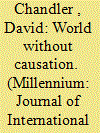

|
|
|
|
|
| Summary/Abstract |
Advocates of Big Data assert that we are in the midst of an epistemological revolution, promising the displacement of the modernist methodological hegemony of causal analysis and theory generation. It is alleged that the growing ‘deluge’ of digitally generated data, and the development of computational algorithms to analyse them, has enabled new inductive ways of accessing everyday relational interactions through their ‘datafication’. This article critically engages with these discourses of Big Data and complexity, particularly as they operate in the discipline of International Relations, where it is alleged that Big Data approaches have the potential for developing self-governing societal capacities for resilience and adaptation through the real-time reflexive awareness and management of risks and problems as they arise. The epistemological and ontological assumptions underpinning Big Data are then analysed to suggest that critical and posthumanist approaches have come of age through these discourses, enabling process-based and relational understandings to be translated into policy and governance practices. The article thus raises some questions for the development of critical approaches to new posthuman forms of governance and knowledge production.
|
|
|
|
|
|
|
|
|
|
|
|
|
|
|
|
| 6 |
ID:
188989


|
|
|
|
|
| Summary/Abstract |
Zoonotic pandemics shine an uncomfortable light on how human lifeways facilitate the sharing of pathogens across species. Yet our lack of acknowledgement of our shared vulnerability with those non-human animals we raise or hunt to kill and eat, whose habitats we encroach upon and destroy, whose populations we undermine and threaten, has led us to the current human health crisis. The predominant political response to zoonotic pandemic has been bordering practices of surveillance, securitisation and bodily separation. These practices reflect intra-human and species hierarchies. They also fail to acknowledge the extent to which the boundaries of species are leaky, and are continually breached. A posthumanist zoonotic politics seeks not to attempt to border the leaky boundaries of species, but rather to insist on a re-ordering of species relations towards less exploitative and extractive ways of sharing the planet with the myriad creatures that constitute our world.
|
|
|
|
|
|
|
|
|
|
|
|
|
|
|
|
|
|
|
|
|